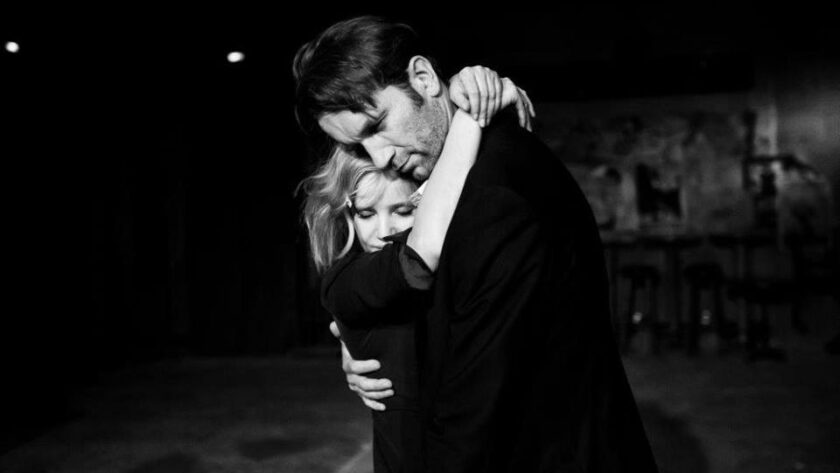Milo Garner reviews Pawel Pawlikowski’s Cannes-winning romance.
If Ida was once considered the announcement of a new voice in the tradition of grimly austere European arthouse, Paweł Pawlikowski seems set on contradicting this assessment with his belated follow-up. Cold War does have some (largely superficial) similarities to that older film, such as the high-contrast black and white photography, continued use of the academy ratio, and the setting: both films spend at least some time in the depressive environs of post-war Poland. But at this point the two diverge with some fervour. Ida is a film that emphasises stillness and contemplation; the camera moves no more than three times, and always with purpose. It is a film about national guilt, about conflicting identities. Its supposedly controversial subject led it to be condemned as anti-Polish by the country’s right-wing, culminating in a petition against Ida that racked up more signatures than the film had cinema admissions – a curious discrepancy. Cold War has instead met a wider commercial success, and its camera (again commanded by the talented Łukasz Żal) flows freely. It is not so much a film about the national as it is the personal. It is not so much a film about loss as about love.

But before delving into the specifics of this assessment, its exceptions must first be considered. The film opens with two Poles, composer Wiktor (Tomasz Kot) and producer Irena (Agata Kulesza), exploring the hinterlands of Poland. They are searching for musicians who have kept the old traditions alive, recording their performances as they travel the wastes. They are also accompanied by a less scrupulous official (Borys Szyc) who sneers at beautiful music sung in Lemko rather than Polish. This small ensemble later endeavours to create a larger one – a folk music group that can amalgamate the various collected traditions into something modern and popular. Irena’s noble intentions are already threatened by the inherent artificiality of any resulting performance, but they are set further back by the intervention of Soviet authorities, who suggest the music might improve with songs about land reform and Stalin. The ensemble conforms, and makes way for, as it were, the anti-Ida: artistry that plays directly to the party line, stripped of much of its truth despite technical excellence. Pawlikowski seems quite clearly to be vindicating his own artistic choices in this progression, and again attacking a troubling reality in contemporary Poland. The conversely positive reception this film has received amongst the would-be critics of its predecessor suggests they may have missed the point.

But then, perhaps not. As for all the intellectual rigour that can be read into the background of Cold War, the flowing foreground is what catches the eye. As much as Wiktor dedicates himself to music, he finds even more interesting the sight of a young singer who auditions for his troupe. Zula (Joanna Kulig) is at once apart from the other girls, all apparently as pure in character as voice. She was imprisoned for mutilating her perverted father, and rather than being ‘authentically’ from the hills and purlieus of Poland, she is a city-slicker who had slipped through the net. The affair the two engage in might initially seem a subplot, but quickly consumes the picture. Their relationship is elliptical in nature, and the narrative reflects this. Sometimes years pass between meetings, their relationship stretching from the late forties through the fifties across borders and against a world in constant flux. Most notable is their time in Paris, in which the songs Zula sung in Poland are given new, bebop renditions, complete with pretentious French translations. This is not so much an attack on the way France consumes and regurgitates culture in its own special fashion than it is a reflection of the development in Wiktor and Zula’s affair. Wiktor is always quick to kowtow to prevailing fashion, while Zula is fiery in her dedication to the authentic self, whatever that may be.

It is in these characters that Cold War finds its greatest success. Beyond the effective acting, they are consistent to a degree that allows the elliptical narration to survive without unnecessary jolting. Each appears to exist beyond the purview of the screen, living lives we do not see but could surely guess at. The occasional insight into their meetings are more punctuation marks than full sentences; room to breathe in the otherwise real (and often gruelling) world they inhabit. At its best it reflects Linklater’s Before trilogy, in which three extended conversations reveal all that lives in between. But this strength does not follow through the film’s entirety, particularly towards it conclusion. At this point scenes become shorter, and the ellipses become more substantial. Pawlikowski’s efforts to cut out any redundancy are admirable, but some additional detail at the tail-end of the couple’s relationship would not have been awry, especially after such efforts had already been spent in elucidating their early and middle days. The characters never contradict themselves and always remain imbued with a certain reality, but film’s structure perhaps cuts their song just a little too short.

But while caught in its melodies, Pawlikowski and cinematographer Żal don’t miss a thing. Żal shoots the action in a high contrast monochrome, somehow suiting the colourful dances of the folk ensemble and the darkened basements of Paris’ nightlife in equal measure. His camera is also permitted literal levity, peering and veering around the various spaces it inhabits. To the rhythm of the music it will spin on an axis, follow through dancing crowds, or shake as the folk dancers leap and pose. The framing might reflect Ida, but the austerity of that film is lost in the music. That film considered jazz as an antidote to repression. Cold War needs no such antidote. And I suppose it is in that gaunt and tempo that it has found such an audience – in its midst, Cold War is little less than a joy.
Yet this same freedom from the weighty demands of a more intellectual cinema might also render it a little less impressive in retrospect. The film is clearly built from the mind of an artist (rather than an entertainer), and constantly hints that it may have a greater secret. The opening and closing scenes in a dilapidated church (that remind of both Ashes & Diamonds and Nostalghia) appear to be reaches at a wider and more affecting truth, but on the thin line between the transcendental and trite I feel Pawlikowski might veer just a little to the wrong side in what becomes a very laboured conclusion. There is a great film lingering somewhere in Cold War, but it seems we’ll have to make do with a very good one instead.
7/10
Cold War will be released in UK cinemas on August 31st. Catch the trailer below:





why does the reviewer claim at once that the conclusion to the film is ‘laboured’ and that it moves too quickly
Something laboured need not be slow
:’)
Thought this movie would be a gritty war film. Boy was I mislead. I want my 16 quid back. This is a disgrace to Cold War veterans.
The first thing to state about this beautiful movie is that it’s monochrome. So stunningly so that at times you feel you are in a photographic gallery rather than a cinema. The quality of the cinematography is quite extraordinary thanks to Lucas Zal.